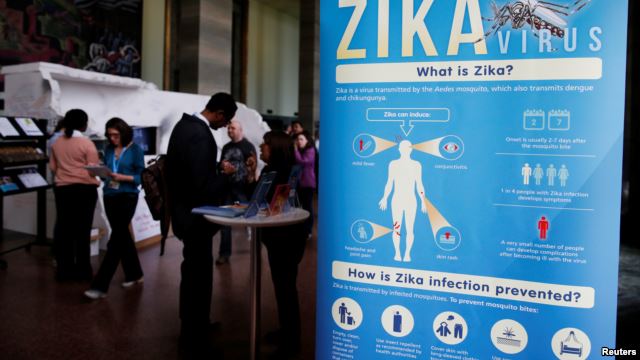You are here
GENEVA—
The World Health Assembly has approved reforms that will increase the U.N. health agency's ability to respond rapidly and more effectively to health emergencies. In Geneva, a panel of experts discussed how new measures will help countries tackle emergencies, such as Ebola, Zika, and yellow fever.

Material to prevent Zika infection by mosquitoes are displayed at the 69th World Health Assembly at the United Nations European headquarters in Geneva, Switzerland, May 23, 2016
Piecemeal reforms of the emergency health system have been under way for years; but, it was the unprecedented Ebola epidemic in West Africa that triggered a serious overhaul of the World Health Organization's method of response.
While Ebola was declared in Guinea in March 2014, it took the WHO five months and many deaths before it pronounced Ebola an international public health emergency. Doctors Without Borders, or MSF, was an early and vocal critic of the agency's slow response to Ebola — a disease that killed more than 11,000 people by the time it was declared over in December.
publish - Lisa SchleinMay 27, 2016
see more at: http://www.voanews.com/content/world-health-assembly--boost-rapid-emergency-repsonse/3347628.html



Comments
World Health Assembly agrees new Health Emergencies Programme
who.int
25 MAY 2016 | GENEVA - WHO Member States today agreed to one of the most profound transformations in the Organization’s history, establishing a new Health Emergencies Programme. The programme adds operational capabilities for outbreaks and humanitarian emergencies to complement its traditional technical and normative roles.
The new programme is designed to deliver rapid, predictable, and comprehensive support to countries and communities as they prepare for, face or recover from emergencies caused by any type of hazard to human health, whether disease outbreaks, natural or man-made disasters or conflicts.
WHO will provide leadership within the context of the International Health Regulations and health, in relation to the broader humanitarian and disaster-management system. As health cluster lead, it will draw on the respective strengths and expertise of a wide range of partners and Member States.
In order to fulfil these new responsibilities, delegates agreed a budget of US$ 494 million for the Programme for 2016−2017. This is an increase of US$160 million to the existing Programme Budget for WHO’s work in emergencies.
Delegates welcomed the progress WHO has made in developing the new Health Emergencies Programme, noting the new implementation plan and timeline, and the establishment of an Independent Oversight and Advisory Committee for the new programme.
They encouraged the ongoing collaboration with the United Nations Office for the Coordination of Humanitarian Affairs to align the management of disease outbreaks and other biological emergencies with the mechanisms and capacities of the Inter-Agency Standing Committee.
They requested the WHO Director-General to report to the Seventieth World Health Assembly on progress made in establishing and operationalizing the programme.
(CLICK HERE FOR CONTACTS AND ADDITIONAL INFORMATION)